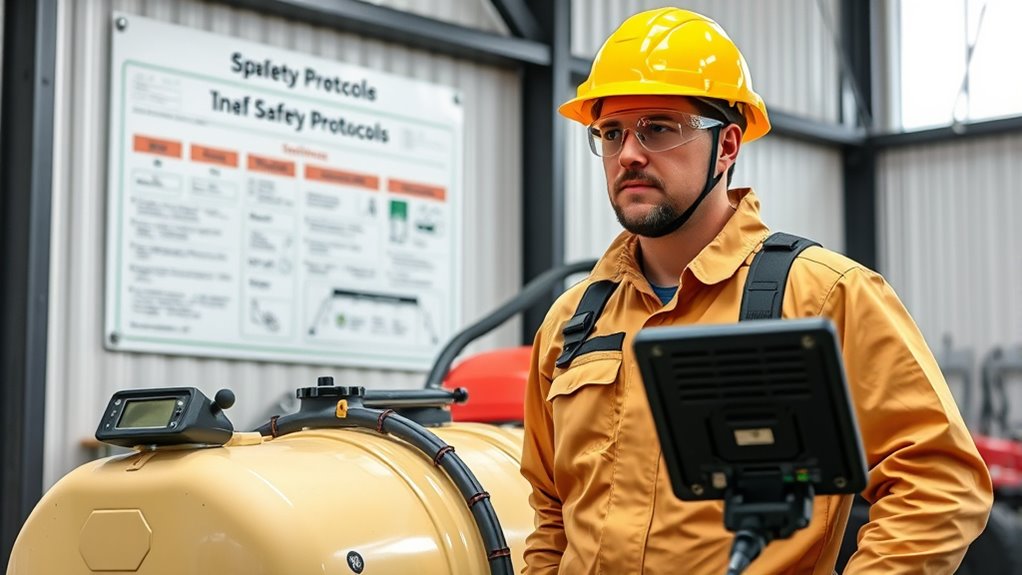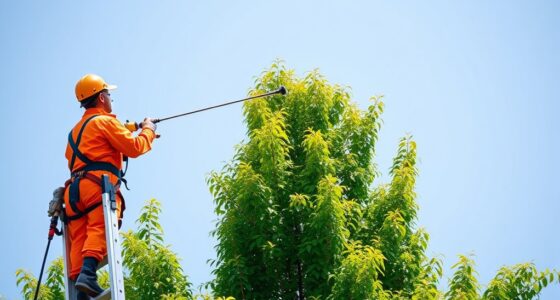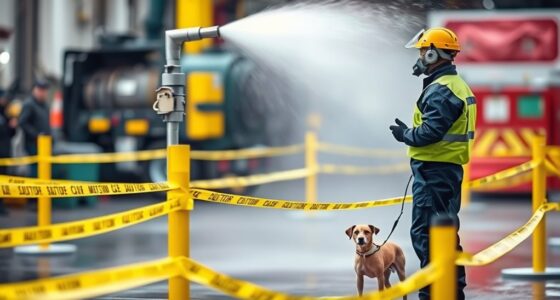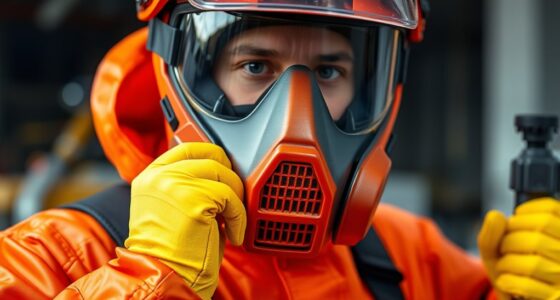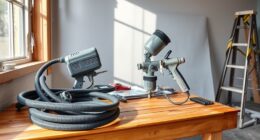To become a professional sprayer operator, you need proper training and certification that cover equipment maintenance, safety protocols, chemical handling, and emergency procedures. This training guarantees you understand how to use PPE correctly, calibrate equipment properly, and follow legal guidelines to protect yourself, others, and the environment. Staying certified confirms your expertise and commitment to responsible pesticide application, and continuing along this path will provide you with even more essential knowledge.
Key Takeaways
- Certification programs ensure operators are knowledgeable about equipment maintenance, safety protocols, and proper chemical handling.
- Training covers equipment calibration, inspection routines, and recognizing wear to prevent application errors.
- Certified operators learn emergency response procedures for spills, exposures, and equipment failures.
- Proper use of PPE and safety guidelines are emphasized to protect health and the environment.
- Ongoing training and certification ensure compliance with legal standards and promote responsible pesticide use.
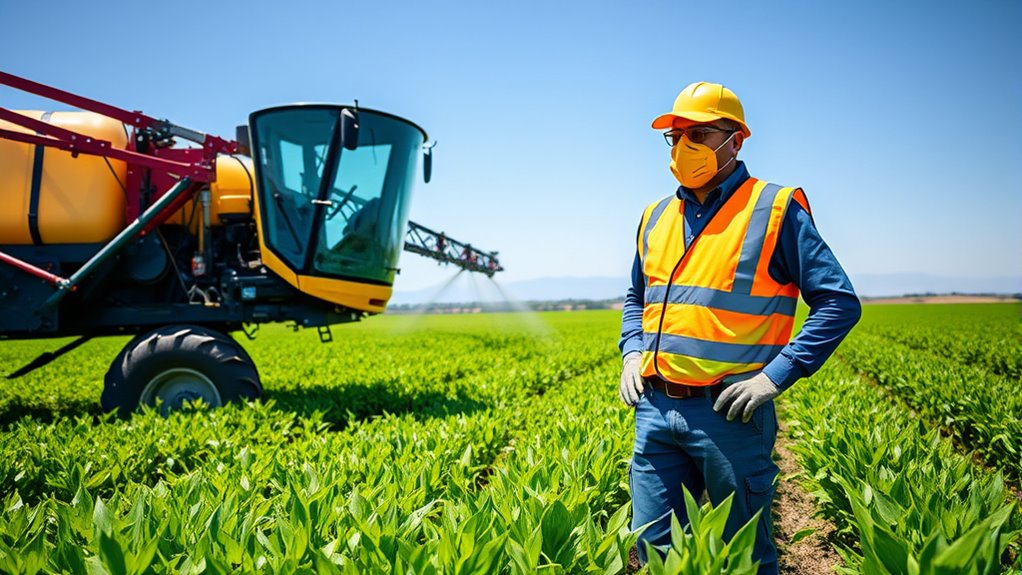
Effective training and certification are essential for professional sprayer operators to guarantee safe and efficient pesticide application. When you understand the importance of proper equipment maintenance, you reduce the risk of malfunctions that could lead to uneven coverage or harmful drift. Regularly inspecting and maintaining your sprayer ensures it operates correctly, preventing leaks, clogs, or worn parts that compromise application quality. Certification programs emphasize these maintenance routines, making sure you’re well-versed in checking filters, nozzles, hoses, and pumps before each use. This not only safeguards your equipment but also protects the environment and your health. Proper maintenance also involves understanding how to identify early signs of equipment failure, which is crucial for preventing accidents.
Proper equipment maintenance ensures safe, efficient pesticide application and protects health and the environment.
Safety protocols are at the core of responsible pesticide application. As a sprayer operator, you must follow strict guidelines to minimize exposure and prevent accidents. Training teaches you how to handle chemicals safely, including wearing appropriate personal protective equipment (PPE) like gloves, masks, and eye protection. Certification programs also stress the importance of understanding label instructions, which detail proper mixing, application rates, and buffer zones. By adhering to these protocols, you lower the chances of drift onto non-target areas and reduce risks to yourself and others nearby.
Your daily routine should include thorough equipment checks, especially when preparing to apply pesticides. Proper calibration is *crucial* to ensure you’re applying the correct amount, which saves resources and avoids over-application that could harm crops or the environment. During training, you’ll learn how to calibrate your sprayer accurately and recognize signs of wear that need immediate attention. This knowledge is *vital* because equipment that isn’t functioning *at its best* can lead to uneven spray patterns, increasing the likelihood of pesticide runoff or ineffective pest control.
Furthermore, safety protocols extend beyond handling chemicals to include emergency procedures. Training programs teach you how to respond if accidental spills or exposures occur. Knowing how to quickly rinse skin, decontaminate equipment, and report incidents helps prevent serious health issues and environmental damage. Certification also involves understanding the legal responsibilities tied to pesticide use, ensuring you stay compliant with regulations and avoid penalties.
In addition, understanding the proper use of personal protective equipment (PPE) and its role in minimizing health risks is a key component of comprehensive training.
Frequently Asked Questions
What Are the Latest Certification Renewal Requirements?
For certification renewal, you need to complete continuing education requirements, usually within a specified timeframe, typically every 1-3 years. You must log a certain number of hours or credits, which can include workshops, online courses, and safety training. Make certain to submit proof of your continuing education to the certifying authority by the renewal deadline. Staying current ensures your certification remains valid and demonstrates your commitment to safe, professional spraying practices.
How Do I Troubleshoot Common Spraying Equipment Issues?
Troubleshooting spraying equipment starts with checking calibration and nozzle selection. Carefully calibrate your sprayer to ensure accurate application, then inspect nozzles for clogs or damage. Consistent cleaning prevents clogs, while replacing worn nozzles maintains spray quality. Adjust settings if spray patterns are uneven, and confirm pressure levels are correct. Regular maintenance and mindful monitoring help you troubleshoot issues quickly, keeping your spraying precise, powerful, and problem-free.
Are There Online Training Options Available for Certification?
Yes, you can find online courses and certification programs for sprayer operators. Many reputable organizations offer flexible online training that covers essential skills and safety protocols. These programs are designed to fit your schedule and often include interactive modules, quizzes, and certification exams. Enrolling in these online options allows you to gain necessary credentials conveniently, ensuring you meet industry standards and operate sprayers safely and efficiently.
What Safety Protocols Should I Follow During Spraying?
You should don your superhero cape—aka personal protective equipment—before spraying, shielding yourself from chemicals and ensuring environmental safety. Make sure to wear gloves, goggles, and a mask, because no one wants a chemical surprise party. Keep wind in mind to prevent drift, and always follow label instructions. Stay alert, avoid shortcuts, and respect your surroundings—because safe spraying keeps everyone—and everything—happy and healthy.
How Can I Advance to Specialized Spraying Certifications?
To advance to specialized spraying certifications, you should explore certification pathways that focus on advanced techniques relevant to your target industry. Look for courses offered by recognized organizations, attend workshops, and gain hands-on experience in specialized areas like horticulture or pest control. Keep up with industry updates and requirements, and consider pursuing higher-level certifications that validate your expertise in these advanced techniques, helping you stand out professionally.
Conclusion
So, next time you confidently wield that spray nozzle, remember: without proper training and certification, you’re just a well-intentioned artist with a questionable palette. Sure, anyone can spray, but few can do it responsibly—yet many pretend they can. Embrace the professionalism, earn your certification, and avoid turning your farm into a chemical wasteland. After all, it’s not just about spraying; it’s about spraying smartly—lest you become the town’s latest cautionary tale.
